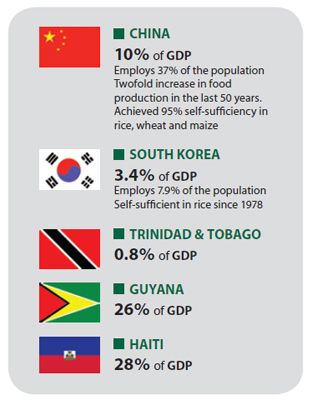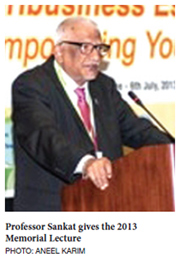 |
 |
 |
|
July 2013
|
Lester Brown, president of the Earth Policy Research Centre in Washington, makes the point in a new book that "Food shortages undermined earlier civilisations. We are on the same path. Each country is now fending for itself. The world is living one year to the next". It is in this context that Professor Clement Sankat, Principal and Pro Vice Chancellor of the St Augustine campus of The UWI, titled his Lewis-Beckford Memorial Lecture – ‘Caribbean Agriculture – at the crossroads’. His lecture was presented at the joint Agricultural Economic Conference at the Hyatt Regency, Trinidad, on July 1st. There are many reasons for the current crisis: population growth, urbanization, rapid development in East/South East Asia, national calamities and droughts, slow supply response, a falling dollar, rising oil price, agro-fuels, low agricultural productivity, neglected aid for science, technology and innovation, few country producers in staple foods for trade. He makes the point that ‘bearing in mind the new global realities of agriculture and its holistic contribution to development, we should attempt to pursue a more balanced strategy which leverages agriculture as an integrator and pushes its value creation to new heights’. Professor Sankat cited statistics from North, Central and South American countries to debunk the myth that as a country grows, the agricultural sector’s contribution to the economy declines. The new thinking measures agriculture as an expanded sector, with linkages to other sectors, and this in fact shows a significant increase in the contribution of food and agriculture to national GDP. The CARICOM statistics – other than for Guyana (22%) and Belize (12%) - were a bit grim in comparison with countries largely showing a flattening or decrease in agriculture and its by-products.
On the eve of the historic CARICOM Summit in Trinidad & Tobago, he urged Caribbean leaders to walk the talk and work to remove all physical and technical barriers to agricultural trade in the region as a matter of urgency. Such action would unleash the creative potential of all peoples in the region with possibilities for agricultural and enterprise development, enhanced income and employment, and increased food security. The Caribbean, he says, has a competitive advantage in its exotic fruits (Trini scorpion peppers are the hottest in the world, Grenada’s nutmeg is world famous as is Jamaica’s Blue Mountain coffee, the finest cocoa and avocado can be found here and the Julie mango originated in the Caribbean) as well as in its livestock (Barbados Black Belly sheep, Jamaica’s Hope cow, Trinidad & Tobago’s Buffalypso and wild meat, especially the agouti and lappe). He indicated that an appropriate strategy for agricultural development in the Caribbean would be one that recognizes the new global realities of agriculture and its holistic contribution to development; he strongly recommended a balanced strategy that recognizes both the need for import substitution as well as agricultural diversification and the exports of products that could be described as uniquely West Indian in character. The ‘concept of unique value propositions is a winning strategy for agribusiness development in the Caribbean, one which has a stronger comparative advantage in this area than in a strategy of price competitiveness for homogenous products’. China, India and the United States, he noted, are the leaders in increased spending on agricultural research and development but, unsurprisingly, the world’s poorest countries lag behind. Professor Sankat reminded the audience that back in 1967 Sir William Arthur Lewis made the point that “the bases for agricultural progress are well known….. Money must be spent on research and agricultural extension to bring knowledge of new seeds, fertilizers and pest and disease control to the farmers. Investment is also needed in roads, water and processing facilities”, following up five years later that “our small farmers ought all to have gone to agricultural institutions”. Indeed, between 2005/2006 and 2010/2011 enrolment in programmes offered by the Department of Agricultural Economics and Extension had just about doubled, from 334 to 671. However, according to UWI data, only 27% of agriculture graduates were employed in the agricultural sector. Others were employed across other sectors, mainly education (22%), health (15%) and financial (10%). Surveys showed that agriculture graduates were among those least likely to say their degree discipline is related to their job and were the least satisfied with their jobs. Embedding and integrating agriculture means mentoring our Caribbean youth. He pointed out that education, internships and mentorships were absolutely important ingredients to encourage young people into the food and agricultural sector but these efforts must be supported by access to land, finances, labour, markets, and good physical and social infrastructure, particularly in rural communities. He encouraged the exposure of young people in urban communities to agriculture with a view to attracting them to get engaged, possibly in more rural settings. In Trinidad & Tobago, there is a Youth Apprenticeship Programme in Agriculture (YAPA), St. Lucia has its Agriculture Forum for Youth (SLAFY), and Guyana’s Kuru Kuru Co-operative College has a long history of programmes targeting the young. The Campus Principal mentioned the rise in the availability and production of shale gas in the United States and other countries, the rise of biofuels, and the new alternative energy technologies that are gaining ground, all of which will reduce dependency on traditional oil and gas exporters. The future outlook from both a price and production perspective could therefore be challenging for countries like Trinidad & Tobago and presents an additional imperative to truly put diversification of our economy at the top of the agenda. Agriculture, in all its forms, is not an easy choice as a career but it is increasingly a necessary choice if a sustainable agricultural sector is to be strategically nurtured and integrated into the matrix of Caribbean society. Professor Clement Sankat, Principal and Pro Vice Chancellor of the St. Augustine Campus of The UWI, is a registered professional Mechanical/Agricultural Engineer with the Board of Engineering of Trinidad & Tobago. He holds a Bachelor’s Degree (First Class Honours) and Master’s in Mechanical Engineering from The UWI and a Doctorate from the University of Guelph’s School of Engineering (Canada). He is a Chartered Engineer (CEng), a Fellow of the Institution of Agricultural Engineers (FIAgrE) of the UK and a Fellow of the Association of Professional Engineers of Trinidad & Tobago (FAPETT). |

 Pair the above statistics with a warning that came from the United Nations in 2012 that “world grain reserves are so dangerously low that severe weather in the United States or other food-exporting countries could trigger a major hunger crisis next year.” According to the UN, “failing harvests in the US, Ukraine and other countries this year have eroded reserves to their lowest level since 1974. The US, which experienced record heat waves and droughts in 2012, now holds in reserve a historically low 6.5% of the maize that it expects to consume in the next year.”
Pair the above statistics with a warning that came from the United Nations in 2012 that “world grain reserves are so dangerously low that severe weather in the United States or other food-exporting countries could trigger a major hunger crisis next year.” According to the UN, “failing harvests in the US, Ukraine and other countries this year have eroded reserves to their lowest level since 1974. The US, which experienced record heat waves and droughts in 2012, now holds in reserve a historically low 6.5% of the maize that it expects to consume in the next year.” Professor Sankat drew reference to the 10 key binding constraints identified by the Jagdeo Initiative: limited financing and inadequate new investments; outdated and inefficient agriculture, health and food safety systems; inadequate research and development; fragmented and unorganised private sector; inefficient land and water distribution and management systems; deficient and uncoordinated risk management measures; inadequate transportation system particularly for perishables; weak and non-integrated information and intelligence systems; weak marketing systems, linkages and participation in growth markets; lack of skilled human resources.
Professor Sankat drew reference to the 10 key binding constraints identified by the Jagdeo Initiative: limited financing and inadequate new investments; outdated and inefficient agriculture, health and food safety systems; inadequate research and development; fragmented and unorganised private sector; inefficient land and water distribution and management systems; deficient and uncoordinated risk management measures; inadequate transportation system particularly for perishables; weak and non-integrated information and intelligence systems; weak marketing systems, linkages and participation in growth markets; lack of skilled human resources.